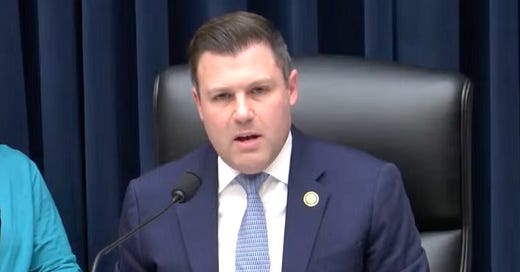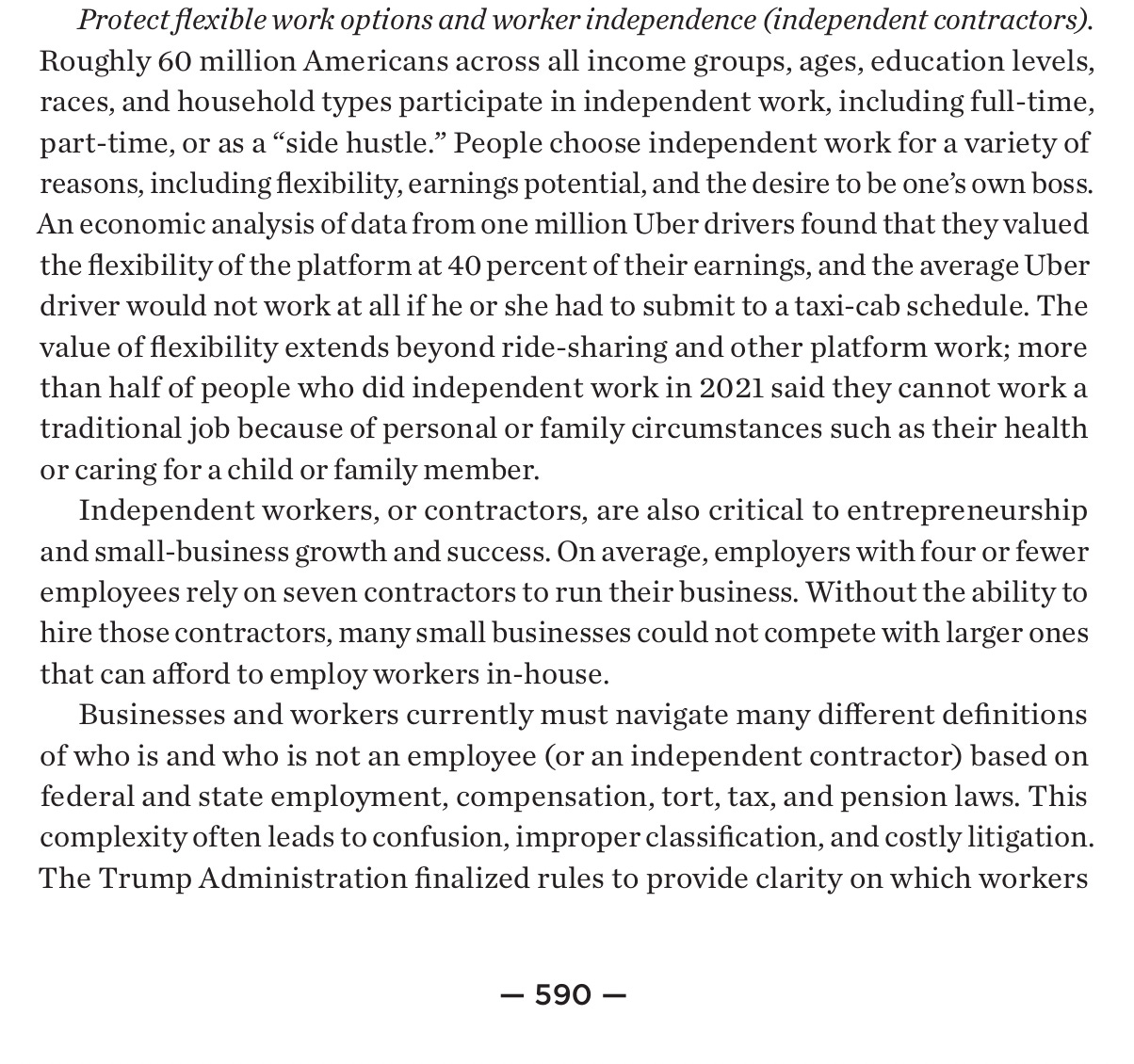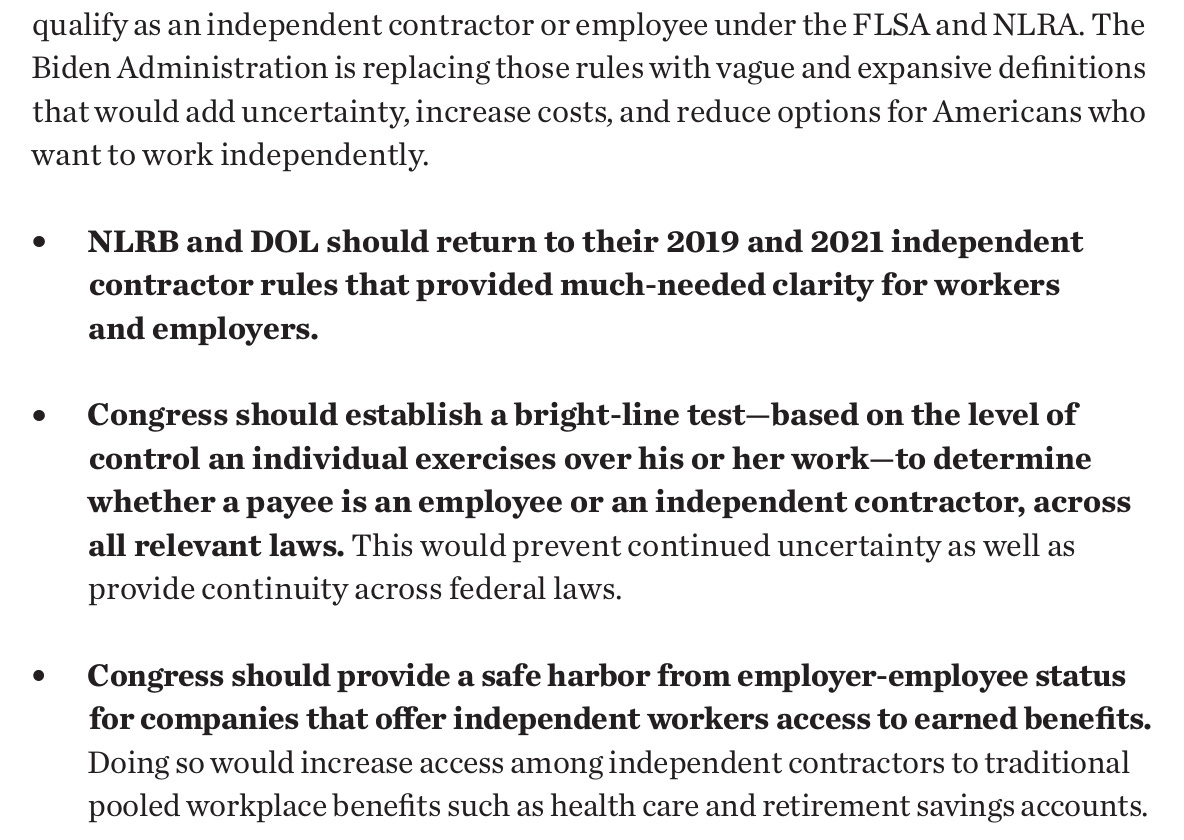'Only Congress Can Stop the Madness'
A hearing this week strongly suggested that Republicans may use their congressional majority to protect independent contractors.
A hearing this week on Capitol Hill offered significant rays of hope that Republicans may use their congressional majority to protect all kinds of independent contractors, all across the country.
This hearing, which took place on Tuesday, was specifically about whether there is a need to update the Fair Labor Standards Act of 1938. The FLSA is one of several federal laws the freelance-busting brigade has used in recent years to try and limit everyone’s freedom to choose self-employment.
I’m a plaintiff in one of numerous lawsuits against the Biden administration with regard to the FLSA. Here’s how our pro bono attorneys at Pacific Legal Foundation explained the problem when our case was filed in federal court:
“The Fair Labor Standards Act of 1938 governs federal minimum wage and overtime law. While the law sets out wage and hour standards, as well as civil and criminal punishment for non-compliant employers, the statute fails to define key terms like ‘employee’ and ‘independent contractor.’
“This lack of uniformly accepted definitions has frustrated courts and the regulated public and put businesses at risk of harsh penalties for over 80 years. Companies and contractors need to know the rules so they can enter into agreements without fear of future enforcement or lawsuits.”
At Tuesday’s hearing, witness Tammy McCutchen—who served as administrator of the U.S. Department of Labor's Wage and Hour Division under President George W. Bush—reiterated this same problem in her opening testimony and called on Congress to fix it:
“Let’s start here: the FLSA applies to employers and employees. Who is an employer? Who is an employee? The definitions in the FLSA, unchanged since 1938, are no help to figure this out. The FLSA defines ‘employer’ as ‘any person acting directly or indirectly in the interest of an employer in relation to an employee.’ Okay, it seems a bit circular. But maybe the definition of ‘employee’ will clear it all up. ‘Employee’ means ‘any individual employed by an employer.’ That’s crystal clear—not!
“Is it any wonder that we have been debating joint employment and independent contracting now for almost a decade? Millions spent on litigation; hundreds of court cases; dueling regulations, from one administration to the next. Only Congress can stop the madness. “
I was also pleased to hear Congressman Ryan Mackenzie, R-Pa., chairman of the Subcommittee on Workforce Protections, explain right from the top of the hearing that he hoped to see bipartisan cooperation when it comes to “bringing a much-needed update to our federal statutes and bring them into the 21st century as the foundation of our nation’s wage and hour protections.”
Specific to independent-contractor policy, Mackenzie said:
“We also saw the Department of Labor under President Biden issue an unworkable, confusing, ABC-style worker misclassification test to determine which workers are employees and which are independent contractors. This rule limits the ability of as many as 70 million freelancers, rideshare drivers and other independent workers to earn a living on terms that they set for themselves.”
Also at this hearing was Congressman Kevin Kiley, R-Calif., a man who deserves a cape and tights for all of his many heroic efforts to try and stop freelance busting. During his days as a California state assemblyman, Kiley fought the devastating statewide Assembly Bill 5, also known as AB5. Now, as a member of Congress, Kiley is the primary sponsor of bills that include the Modern Worker Empowerment Act, which would update both the Fair Labor Standards Act and the National Labor Relations Act to help protect independent contractors everywhere against what happened in California.
Kiley directed comments to witness Jonathan Wolfson, who is chief legal officer and policy director of the Cicero Institute:
“Mr. Wolfson, you’ve done some outstanding work on supporting independent workers, freelancers, who comprise about a third of the American population. At this point, that number is fairly likely to grow. I think it’s very important that right now, we take advantage of the opportunity to put protections for independent workers into statute, which is why I’ve introduced the Modern Worker Empowerment Act and Modern Worker Security Act. …
“Would you mind just giving us a brief recap of the effect that the attacks on independent workers had in California with AB5, as your institute has shown, and then the threat posed by the Biden administration's effort to sort of mimic that legislation?”
Wolfson then described what happened in California after the state imposed AB5 on independent contractors in all kinds of professions, and why it’s so important to prevent that same thing from happening anywhere else:
“After California passed AB5 … The New York Times told photographers, freelance writers in California they wouldn't work with them anymore because they didn't want to have to provide the benefits that California was going to require them to provide those workers for just a small amount of work. And so people in the film industry, people in lots of industries were making significant sums of money, lost their positions. And so people in your district were losing their jobs. Truckers were told: You are no longer going to be allowed to move products from the ports, out of the ports, including when we had massive port challenges of moving goods during Covid. …
“Those workers knew the risks and the benefits that they were taking upon themselves in starting the business. And then California's Legislature came in and they said: ‘We’re not going to allow you to allow you to make that decision anymore. We’re going to protect you from yourself. We’re going to protect you from making money, because we think we know better what your relationship with another business ought to look like.’
“And the reality is, we don’t do that in most places in America. … I thank you for proposing those bills. I think both those bills will go a long way toward helping workers in states across the country who want to be independent workers to be able to be independent workers, to work with those businesses and not discourage those businesses from hiring them.”
Also deserving of a big shout-out for what she said at this week’s hearing is Congresswoman Mary Miller, R-Ill., who used her time to ask questions of both McCutchen and Wolfson.
One question Miller asked McCutchen was about the differences between the ABC Test—which is the career-destroying regulatory language within California’s AB5—and the language that the Modern Worker Empowerment Act would use to determine who can legally earn income as an independent contractor.
McCutchen responded:
“I'll answer that for both the ABC Test and the current regulations of the Department of Labor.
“The proposed legislation is very simple: Who controls the work of the employee? If it’s the worker, then the worker is an independent contractor. If it’s an organization, then they’re the employer.
“The ABC Test is complicated. Nobody understands it, and even in California, where it was enacted into statute, there are over 50 exceptions and exemptions to it. And the same thing with DOL’s regulations. There’s a last section that says, ‘Uh, and we will consider any other factor that we find relevant,’ which makes it impossible, from the beginning, for people to understand whether they’re independent contractors or whether they’re employees, and for small businesses to understand that too.
“And if they don't understand, if they don’t know the rules, then how can we expect them to get it right? We shouldn’t call it wage theft. We should call it good people trying to follow the law, but they need to be told what the law is clearly and simply.”
Miller then turned her attention to Wolfson and said:
“Mr. Wolfson, survey after survey shows that independent contractors prefer their current work arrangement to being an employee. The Biden administration’s attempts to restrict independent contracting were an affront to independent contractors who made their preference clear. What can Congress and the Trump administration do to support and protect the independent workforce?”
Wolfson had several suggestions, including Congress passing the Modern Worker Empowerment Act and the Modern Worker Security Act that Kiley recently sponsored.
Kudos to all these members of Congress and witnesses for so effectively explaining the policy problem, and for so clearly stating what Congress needs to do to start fixing it for independent contractors all across the country.
The Freelance Busters
There were, of course, also members of Congress at this hearing who support freelance busting. They still want to see the ABC Test from California’s AB5, or regulatory language similar to it, imposed on independent contractors all across the country. Many of them just co-sponsored the Protecting the Right to Organize Act, or PRO Act, which includes an ABC Test based on California’s AB5.
So, that’s the bad news.
The good news is that the freelance-busting brigade is in the minority in Congress right now—and based on their performance at this hearing, they have learned zero new decent dance steps since their electoral drubbing this past November.
In fact, representatives who want to restrict every American’s freedom to be our own bosses mostly used their time to repeat old talking points and create what I have to assume were clips about Project 2025 bound for social media.
Congressman Bobby Scott, D-Va., repeated almost verbatim the same schtick he performed back when I testified before this same subcommittee in 2023. I call it his “laundry list” bit. He asks the Democratic Party’s witness a series of rapid-fire questions, and the witness answers a simple “no” after each one:
Do independent contractors have a guaranteed minimum wage and overtime?
“No.”
Are independent contractors covered by unemployment insurance?
“No.”
Do independent contractors get workers’ compensation?
“No.”
With this kind of questioning, Scott is implying that nobody in their right mind would want to be an independent contractor. My goodness—look at everything you’re being denied that traditional employees receive. The horror!
In truth, the reason Scott asks these questions only of the Democratic Party’s witness at these kinds of hearings is because if he were to ask the same question of an actual independent contractor like me—one of the 80% of independent contractors who does, in fact, wish to be self-employed—the answers would be quite different.
Do independent contractors have a guaranteed minimum wage and overtime?
No, as an independent contractor, I’m not entitled to the current federal minimum wage of $7.25 per hour or overtime based on that amount. Nor would I want to earn a living at that level. It’s less than I made with tips when I dished pizza on the Jersey Shore boardwalk 35 years ago as a teenager. For many years now as a professional freelance writer and editor, I have earned in the low six figures.
Are independent contractors covered by unemployment insurance?
No, but like the majority of independent contractors, I feel more secure being my own boss than I ever did as a staff employee with unemployment insurance. Unlike staff employees, I have multiple clients and streams of income. No single client controls—or can take away—my entire income the way an employer can.
Do independent contractors get workers’ compensation?
No, I’m not entitled to workers’ compensation if I am injured on the job. Then again, I’m not sure how I could be injured on the job. I type on my laptop computer, usually in my home office or out on my porch if the weather is nice.
The other freelance buster who tried to make it seem as if being an independent contractor is often horrible—again, the opposite of what most independent contractors have told the government for years now—was Rep. Greg Casar, D-Texas, who is also chairman of the Congressional Progressive Caucus.
Casar didn’t ask any witnesses questions. He used all his time to pontificate from the dais about why he thinks the Modern Worker Empowerment Act is a bad bill:
“So just to break down what my colleague from the Republican majority side of the aisle just advocated for is this bill they're calling Modern Worker [Empowerment] Act that’s going to help you, but really, at the end of the day, let’s break down what it is the Republican majority wants to do to the American worker. They want to make it so that multibillion-dollar companies don’t have to pay their taxes. Instead, you, their employee has to pay more in taxes. That’s what their bill is all about.
“The Republican majority’s bill is attacking the labor standards that we won after the Great Depression under FDR. What they want is to say big, multibillion-dollar companies don’t need to pay overtime to you. No, you need to work over 40 hours a week and not get paid anything extra for it. That’s, at the end of the day, what this bill is all about. You’re going to continue to hear under this Republican majority that they are for letting you be your own business owner. And if people are in indeed independent contractors and small businesses, we should absolutely support them and support that. What they want to do is to make it so that people who are employees of large corporations instead be mislabeled as small business owners.
“But if you’re just an employee being told where to go work, when to go work, and to just go do your job for a big corporation—call it a big corporation in Big Tech, or a big corporation in Big Pharma or a big construction company—they want to be able to say you’re your own business, so you pay the taxes instead of the big corporation. They want to say you’re your own business, and so you don’t get overtime protections. You just have to labor away until the job is done and get paid whatever you’re told.
“So we should not buy some of these continued attacks on what workers won in the 1930s. I’ve seen this happen in my own district, where a group of workers that clearly, basically, ran all of YouTube Music, and YouTube is a part of Google, wanted to organize into a union, and what we heard from Google was these aren’t our workers, even though this contractor that they work for only exists because of Google. Only exists to run YouTube. But they wanted to deny their ability, deny these Austin, Texas-based workers their ability to negotiate for higher wages and higher pay. So don’t buy this stuff about how we’re trying to help small businesses, when really what this bill would do would make it so that the American worker cannot negotiate with gigantic corporations like Google.”
Casar also accused Republicans of supporting child labor in the agricultural sector:
“What we are seeing Republican support for is letting companies off for child labor in that same sector, so the Fair Labor Standards Act should actually be protected and supported and expanded for the American worker. And what I’ve heard this whole committee—I’ve been watching it from my office, came down here and watched some of the testimony from the other side of the aisle, just a moment ago—is all about taking us to pre-1938 labor standards. That’s what's in Project 2025. That’s what’s being executed right now, is making it easier to put children on the cutting-room floor to do child-labor jobs, not making sure our kids can have a good education and making sure their parents are paid well enough that they don’t feel pressure to send their kids to go work in the factory or at the meatpacking plant illegally.”
As a couple points of fact, I don’t know any independent independent contractor who enjoys paying the self-employment tax that employees do not have to pay. If Casar is interested in eliminating that tax, he’ll have plenty of support from self-employed Americans.
Also, when it comes to Project 2025, pages 590 and 591 are the section about independent contractors. They state that the government should provide clarity in regulatory language to protect legitimate independent contractors.
This section of Project 2025 does not state that employees should be denied overtime pay or unionization rights; it does not state that companies should be allowed to treat employees as independent contractors; and it does not mention child labor at all:
It is fair to say that Kiley’s Modern Worker Empowerment Act and Modern Worker Security Act would do what Project 2025 describes for independent contractors.
However, the characterization of those policy shifts as being tax or child-labor scams does not comport with reality.
Instead, these policies would align the government with precisely what most independent contractors have been telling lawmakers and researchers we want, for years now. These policies also would support the widely held desire among the majority of Americans to earn a living as our own bosses here in the year 2025.
Call Your Lawmakers
I’m quite optimistic, after watching this hearing, that Republicans intend to use their congressional majority and White House control to try and protect independent contractors everywhere. This help cannot come a moment too soon for those of us whose incomes and careers have been under constant attack nationwide.
All of us who value the freedom to be our own bosses need to support these lawmakers who are trying to protect us.
To help get the ball rolling, I reached out to the office of Congressman Tom Kean, Jr., where I live in the NJ07. I asked him to sign on as a co-sponsor of Kiley’s legislation. I’m beyond pleased to say that Kean’s name was added this week as one of the earliest co-sponsors of both the Modern Worker Empowerment Act and the Modern Worker Security Act.
As with Kiley in California under AB5, Kean saw during his time as a state lawmaker here in New Jersey—which tried, and thankfully failed, to pass an AB5 copycat bill in 2019-20—just how awful freelance busting can be. That experience also showed him just how forcefully the public will rise up to protect our freedom to earn a living.

These members of Congress are trying to make our voices heard, and make our nation’s laws work for us all. You can help them from wherever you live by doing exactly what I did.
Call your representative’s office. Ask him or her to co-sponsor the Modern Worker Empowerment Act (H.R. 1319) and the Modern Worker Security Act (H.R. 1320). If you don’t know who your member of Congress is, click here and type in your ZIP Code. That will give you the phone number to call.
That’s it. Make a phone call. Ask your representative to represent what you want.
Maybe do it twice, if your representative doesn’t do what you ask the first time. After all, as McCutchen testified, “Only Congress can stop the madness.”






